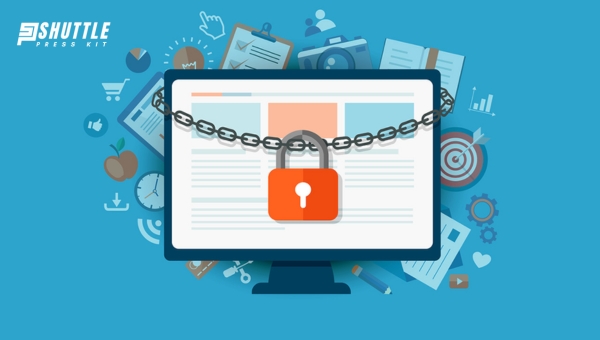Have you ever worried about your private stuff getting out on the internet? You’re not alone. I’m here to talk about protecting your online life because that’s super important these days. When it comes to data protection, there are sneaky folks and clever programs out there just waiting to snatch your info. So, let’s keep those prying eyes away from our personal details, shall we?
To keep your online privacy safe and sound, start with strong passwords – think of them like the sturdy locks on your doors. And watch out for those tricky phishing emails; they’re fishing for your secrets! Keep your guard up by keeping all software up to date, it’s like giving vaccines to your devices against viruses. Use secure networks and think of using a VPN (a special tunnel that keeps peepers off your browsing). Remember folks, staying safe online is all in a day’s work – do these simple things and sleep tight knowing you’ve got data protection down pat!
Understanding Data Privacy
Data privacy revolves around the safeguarding of personal information from unauthorized access and misuse. In the current digital age, this term encompasses a broad spectrum of personal details such as an individual’s name, contact information, browsing habits, and financial data.

With the proliferation of internet usage, ensuring the confidentiality of this information goes beyond cautious sharing; it extends to protecting data from being tracked or collected through online activities. Technologies like cookies and trackers monitor user behavior extensively for targeted advertising, while cybersecurity threats pose risks of data breaches.
The Scope and Importance of Protecting Personal Information
Data privacy is not only about protecting individual autonomy over their personal details but also involves a complex field within information security aimed at preventing unauthorized data access. This field includes employing various tools like ad blockers to minimize tracking, utilizing password managers for securing accounts and adopting two-factor authentication as an additional security layer.
Given the frequency of cyber-attacks and data leaks in today’s internet landscape, taking steps to ensure one’s digital footprint remains confidential is imperative for maintaining privacy and security online.
Also Read: Starlink Volcano Mount Guide: Easy DIY Installation Tips
Essential Tips for Enhancing Online Privacy Protection
In an age where digital footprints are vast and often permanent, protecting your online privacy is crucial. The internet brings the world to our fingertips, but it can also expose our personal information to unwanted eyes.

Following a few key steps can significantly bolster your online privacy, safeguarding you from potential cyber threats and ensuring your data remains confidential.
Keeping Connection Secure
- Be Cautious on Public Wi-Fi Networks: Public networks are convenient but rarely secure. Whenever possible, avoid accessing sensitive accounts or conducting important transactions while connected to public Wi-Fi.
- Utilize Strong Encryption for Your Home Network: Ensure your home Wi-Fi network is protected with WPA2 encryption. This standard provides strong security that prevents unauthorized access to your digital communications.
- Employ a Virtual Private Network (VPN): A VPN encrypts your internet connection, hiding your browsing activity from snoops on public networks and even masking your IP address from the websites you visit.
- Regularly Update Your Privacy Settings: Take time to review and adjust privacy settings on social media platforms and other online accounts. Opt for the most restrictive settings to limit what others can see about you.
Maintain Privacy While Browsing Online
In an era where digital footprints are closely monitored, maintaining privacy during internet sessions has become paramount. By implementing certain measures, users can significantly enhance their online anonymity and secure personal data from potential interception or misuse. Follow these steps to help shield your activities from prying eyes:
- Always Opt for HTTPS Websites: Ensure the URL starts with “HTTPS” rather than just “HTTP.” The ‘S’ stands for secure, indicating that the connection between your browser and the website is encrypted. Modern browsers typically display a padlock icon next to secure sites.
- Utilize a Reliable VPN Service: A Virtual Private Network (VPN) encrypts your internet traffic and masks your IP address by routing it through a server chosen by you. Opt for reputable paid VPN services like ExpressVPN or NordVPN for enhanced security without the risk of your data being sold.
- Check Browser’s Security Symbols: Before submitting any sensitive information like passwords or credit card numbers, look for security symbols in your browser’s address bar, such as a padlock icon, which signifies that the connection is secured.
Also Read: Starlink vs HughesNet: Which Wins the Satellite Battle?
Maintaine Device Health and Security
Ensuring the long-term health and security of your devices is crucial in an age where digital threats are constantly evolving. Keeping devices secure not only protects your personal information but also enhances device performance. Here are key steps to maintain optimal health and security for your gadgets:
- Regularly Update Software: Always install the latest software updates for your operating system and applications. These updates often include critical security patches that protect against new vulnerabilities.
- Use Antivirus Solutions: Install reputable antivirus software on computers and Android devices to safeguard against malware, viruses, and other malicious threats. Perform regular scans to detect any issues early.
- Download From Trusted Sources Only: Ensure that all software, apps, or files are downloaded from reputable sources such as official app stores or directly from developers’ websites to minimize the risk of inadvertently installing harmful software.
- Enable Automatic Updates: Turn on automatic updates for your device’s operating system and applications. This ensures you receive important security fixes as soon as they’re available without delay.
Cleaning Up Unused Mobile Apps and Browser Extensions
Over time, our digital devices can become cluttered with mobile apps and browser extensions that we no longer use. Not only can these slow down your device, but they may also pose security risks if not regularly updated or managed. Removing these unused items can help keep your digital life more organized and secure. Here’s a simplified approach to cleaning up:
- Identify Unused Apps: Periodically review the applications installed on your mobile device. If you haven’t used an app in a few months, it’s probably safe to remove it.
- Check App Permissions: Before removing an app, consider the permissions it has. This is especially important for apps that might have had access to sensitive information.
- Uninstall with Caution: To uninstall an app, simply hold down its icon (for mobile devices) or go through the ‘Add or Remove Programs’ feature in your computer’s control panel (for desktop apps). Follow the prompts to complete the removal.
- Review Browser Extensions: Open your web browser’s extension manager page (usually found within settings) to see a list of installed extensions. Look for ones you no longer need or recognize.
- Remove Unnecessary Extensions: Carefully evaluate what each extension does and if it’s critical to your daily browsing needs. If not, select the option to remove or disable it from your browser.
Also Read: Starlink Dimensions Simplified: Nail Your Satellite Setup
Prevent Search Engines from Tracking You
Search engines like Google, Bing, and Yahoo track a significant amount of personal data from their users. This data collection includes search queries, browsing history, and even location details stored to tailor ads and content. However, for those concerned about privacy online, there are several strategies you can employ to minimize or prevent being tracked by these services.
- Delete Your Search History: Regularly go through your Google Activity dashboard (or the equivalent for Bing and Yahoo) to clear your search history, location history, and other activity data.
- Adjust Privacy Settings: Dive into the settings on your preferred search engine and disable features that allow for extensive data tracking. Look for options related to ad personalization and activity tracking.
- Switch to a Privacy-Focused Search Engine: Consider using alternatives like DuckDuckGo that are designed not to track user information or store search queries.
- Use Incognito/Private Browsing Modes: While this doesn’t stop websites from collecting information about your visits completely, it does reduce the amount of data stored on your device over time.
By taking these steps consistently, you can enhance your online privacy substantially by preventing search engines from keeping excessive tabs on your digital footprint.
Also Read: Starlink Cable Routing Kit: Easy Install Guide!
Frequently Asked Questions
What is data protection in simple terms?
Data protection involves measures and practices to safeguard personal information from unauthorized access and ensure privacy.
Why is online privacy important?
Privacy online helps protect your personal and financial information from theft and reduces the risk of identity fraud.
How can I improve my online privacy?
Strengthen your privacy by using strong, unique passwords, enabling two-factor authentication, and being cautious about the personal information you share online.
What is the best way to protect sensitive information?
The best protection is to encrypt sensitive data, use secure connections (VPN), and regularly update your privacy settings on social media and other platforms.
Also Read: Amazon’s Project Kuiper vs Starlink: Showdown Unpacked
Conclusion
In today’s digital age, protecting your online privacy has become a paramount concern. The steps outlined above offer a robust foundation for safeguarding your personal information on the internet.
By adhering to these practices, such as using strong, unique passwords, enabling two-factor authentication, and being vigilant about the information you share on social media, you can significantly reduce your vulnerability to cyber threats.
